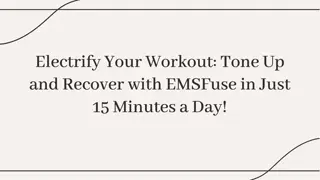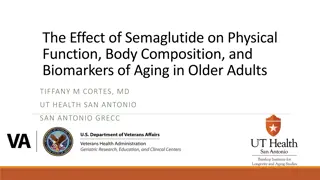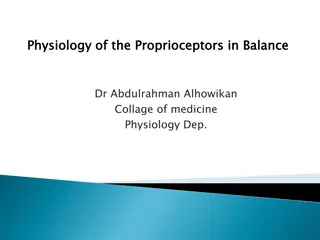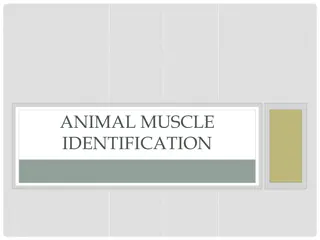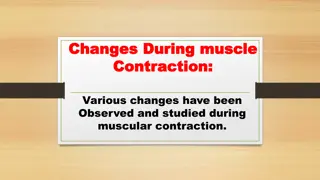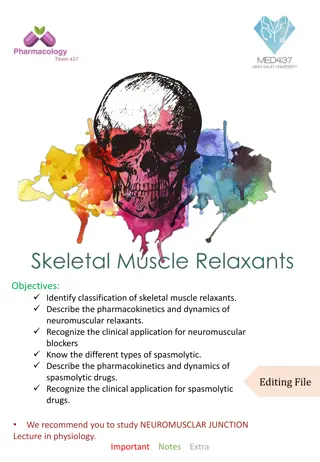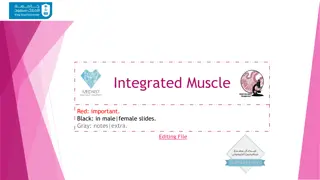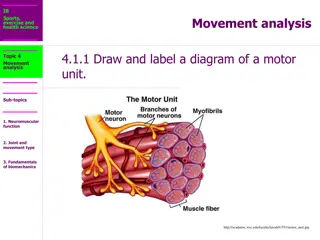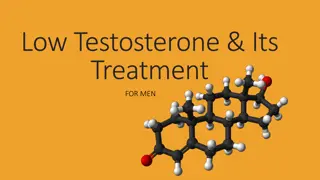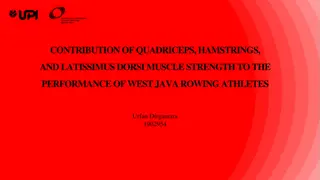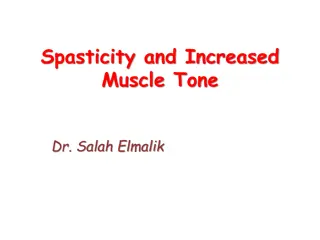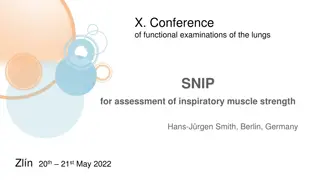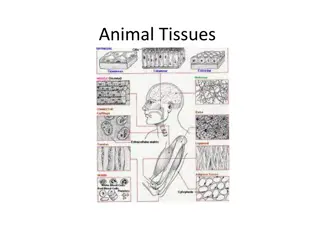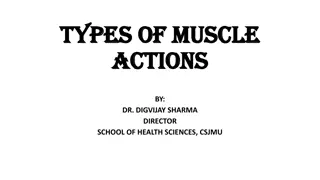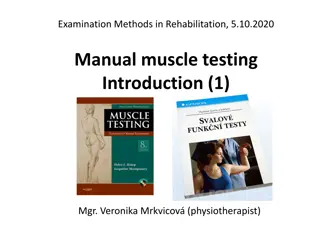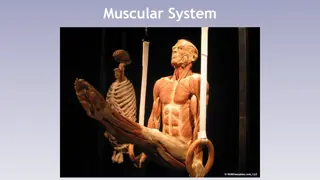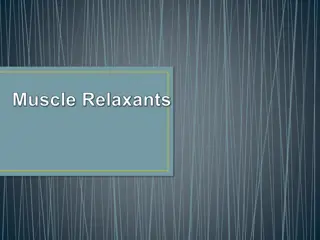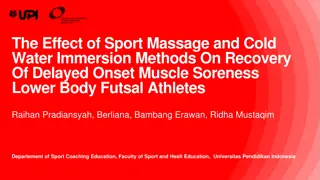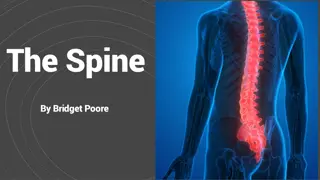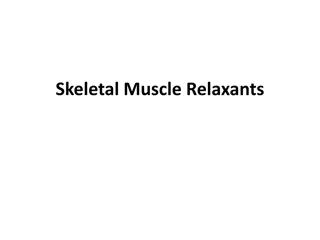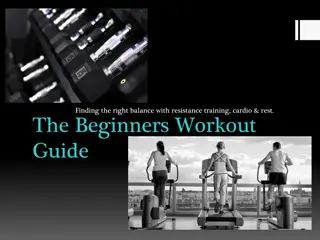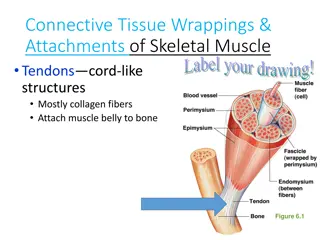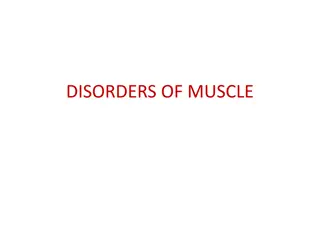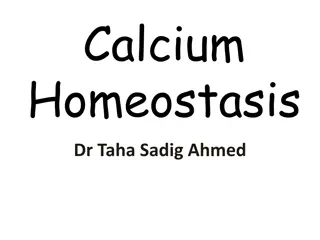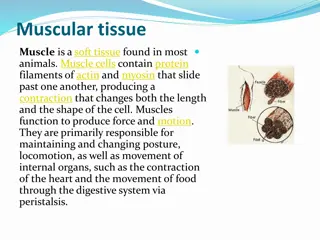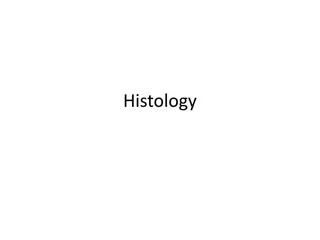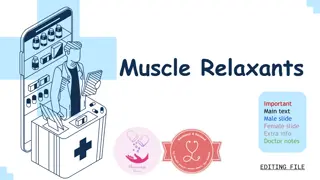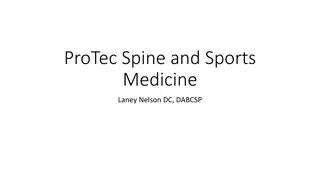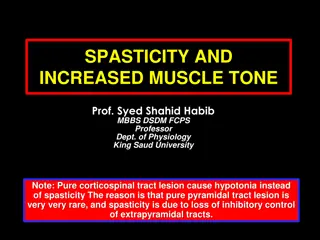The muscular system
The muscular system is a vital organ system that includes smooth, skeletal, and cardiac muscles. It plays a crucial role in locomotion, supporting the cardiovascular system, enabling lung ventilation, regulating fluids, maintaining posture, and generating heat in the body. This system consists of ar
2 views • 16 slides
Understanding Motor Proteins and Cytoskeletal Dynamics in Cell Biology
Motor proteins, such as myosin, kinesin, and dynein, utilize chemical energy to move along cellular tracks, influencing processes like muscle contraction, organelle movements, and cellular migration. With the ability to translocate using ATP hydrolysis, these proteins play crucial roles in various c
5 views • 14 slides
Understanding Downer Cow Syndrome (DCS) in Cattle
Downer Cow Syndrome (DCS) is characterized by the inability of cows to rise, commonly seen around calving. It is associated with metabolic disorders, physical injuries, and prolonged recumbency. Risk factors include poor housing conditions and health issues like mastitis. Clinical signs range from d
2 views • 13 slides
Supplement Adda: Elevate Your Fitness with Isopure Whey Protein
Experience the pinnacle of muscle-building nutrition with Supplement Adda's Isopure whey protein. Our premium blend of whey protein concentrate delivers unmatched results, helping you achieve optimal muscle gain and enhance your athletic performance. Elevate your fitness journey with Supplement Adda
5 views • 1 slides
Skeletal Muscle Relaxants and Neuromuscular Blockade
Skeletal muscle relaxants are used to induce muscle relaxation during surgeries. Neuromuscular blocking agents act at the neuromuscular junction. These drugs can either peripherally reduce muscle tone or centrally cause muscle paralysis. Different types of muscle relaxants are classified based on th
6 views • 23 slides
Unveiling the Best Mass Gainers in India for Maximum Muscle Growth
Discover the ultimate solution for achieving your muscle-building goals with the best mass gainers available in India. Our comprehensive guide delves into the top-rated products designed to support your mass gain journey effectively. Whether you're a beginner or a seasoned fitness enthusiast, these
6 views • 1 slides
Elite Mass Gainers: Powering Muscle Growth in India
Discover the elite mass gainers revolutionizing muscle growth in India. Packed with essential nutrients and crafted for maximum effectiveness, these top-tier supplements are your key to achieving a stronger, more defined physique. Say hello to gains and goodbye to guesswork with the best mass gainer
2 views • 1 slides
Boost Muscle Tone and Recovery with EMSFuse in Just 15 Minutes a Day!
Experience Enhanced Muscle Toning with EMSFuse: Revolutionize your fitness routine with EMSFuse, the cutting-edge solution for muscle toning and recovery. Harness the benefits of EMS to build stronger muscles, alleviate pain, and speed up healing. Achieve optimal fitness results in just 15 minutes d
1 views • 8 slides
Effect of Semaglutide on Aging Biomarkers in Older Adults
Semaglutide, a GLP-1 receptor agonist, shows promising effects on physical function, body composition, and aging biomarkers in older adults with diabetes. Studies suggest potential neuroprotective effects, improvement in skeletal muscle atrophy, and reduction in pro-inflammatory markers. Diabetes pr
0 views • 23 slides
Understanding Proprioceptors and Their Role in Body Balance
Proprioceptors play a crucial role in providing information about the position of body parts, muscle spindle response to stretch, and muscle tension regulation. Muscle spindles and Golgi tendon organs are key components in maintaining muscle tone and ensuring proper reflex actions. This article delv
1 views • 23 slides
Animal Muscle Identification and Anatomy Diagrams
This collection includes detailed diagrams showcasing the identification and anatomy of muscles in animals, specifically focusing on pig muscle anatomy. From head and neck muscles to arm and shoulder muscles, pelvis and thigh muscles, and trunk muscles, these visual aids help understand the structur
3 views • 26 slides
Muscle Contraction Phases and Responses: A Comprehensive Overview
Various changes observed during muscle contraction include the latent period, contraction phase, and relaxation phase. Muscle twitch, tetanus, and their durations are important phenomena in understanding muscle physiology.
0 views • 14 slides
Skeletal Muscle Relaxants: Classification, Pharmacokinetics, and Clinical Applications
Skeletal muscle relaxants encompass different types, including neuromuscular blockers, spasmolytic drugs, and peripherally-acting agents. They are classified based on mechanisms of action and play crucial roles in inducing skeletal muscle relaxation for various clinical applications. Understanding t
3 views • 12 slides
Understanding Electromyography (EMG) and Motor Neurons
Electromyography (EMG) is an electrodiagnostic technique used to evaluate muscle health by measuring electrical activity. EMG measures muscle response to nerve signals, displayed as waves on an oscilloscope. Motor neurons transmit signals from the brain to muscles, enabling movement. Upper motor neu
2 views • 8 slides
Understanding the Histological Structure of Muscle Cells
This presentation delves into the histological structure of three types of muscle cells - skeletal, cardiac, and smooth muscles. Learn about their differences, such as striation, voluntary vs. involuntary control, and cellular organization. Discover the components of muscular tissue, the coverings o
0 views • 13 slides
Understanding Motor Units and Neurotransmitters in Muscle Contraction
Motor units consist of a motor neuron and the muscle fibers it innervates. Neurotransmitters like acetylcholine play a vital role in stimulating muscle contraction by transmitting signals at the neuromuscular junction. This communication between neurons and muscles is essential for proper movement a
0 views • 30 slides
Understanding Low Testosterone Levels and Treatment Options for Men
Testosterone is a vital steroid hormone that plays a key role in the development of male characteristics. Low testosterone levels can lead to various health effects, including decreased muscle mass, bone density, and libido. Testosterone replacement therapy (TRT) is commonly used to treat males with
0 views • 36 slides
Impact of Plyometric Jump Training on Leg Muscle Power in Badminton Athletes
Plyometric jump to box and double leg hop training can significantly improve leg muscle power in badminton athletes, enhancing their ability to execute powerful smashes. This study focuses on the effects of specific plyometric exercises on leg strength essential for optimal badminton performance. Th
0 views • 9 slides
Contribution of Quadriceps, Hamstrings, and Latissimus Dorsi Muscle Strength to Rowing Performance in West Java
Rowing is a demanding sport that requires strong leg muscle strength for optimal performance, particularly in West Java where rowing athletes train. This study aims to investigate the contribution of quadriceps, hamstrings, and latissimus dorsi muscle strength to the performance of rowing athletes i
0 views • 16 slides
Physiotherapy Support for Mothers with OASI - Expert Guidance and Rehabilitation
Providing specialized physiotherapy support for mothers experiencing Obstetric Anal Sphincter Injuries (OASI) is crucial for addressing immediate problems like pain, urinary or fecal incontinence, and more. With a focus on pelvic health, this approach involves reassurance, tailored pelvic floor musc
0 views • 12 slides
Understanding Spasticity and Increased Muscle Tone in Neurological Disorders
Spasticity and increased muscle tone are common features in neurological disorders, characterized by hyperactive stretch reflexes and muscle contractions. Spasticity is velocity-dependent and associated with upper motor neuron lesions, leading to increased resistance to passive movement. Rigidity, o
0 views • 28 slides
Sniff Nasal Inspiratory Pressure (SNIP): Assessing Respiratory Muscle Strength
SNIP is a sensitive non-invasive test that measures inspiratory muscle strength by assessing nasal pressures during a sniff maneuver. It is a valuable tool for early detection of respiratory muscle decline, providing insights into potential threats like hypercapnic respiratory failure, impaired coug
0 views • 11 slides
Understanding Animal Tissues: Epithelial, Muscle, Nerve, and Connective Tissues
Explore the four general categories of animal tissue - epithelial, muscle, nerve, and connective tissues. Learn about the traits, classification, examples, and functions of each type of tissue. From the tightly packed cells of epithelial tissue to the excitable nature of muscle tissue, delve into th
1 views • 22 slides
Understanding Types of Muscle Actions in Physiology
Explore different types of muscle actions, including isometric contractions, isotonic contractions, concentric contractions, eccentric contractions, isokinetic contractions, and iso-inertial contractions. Each type plays a crucial role in muscle function and movement, with varying effects on muscle
0 views • 14 slides
Importance of Manual Muscle Testing in Rehabilitation
The assessment of muscle function is crucial in various medical exams, showing correlations with quality of life, work productivity, and aging-related issues. Manual muscle testing is commonly used by healthcare professionals to evaluate muscle strength and guide treatment plans. Assessing muscle fu
0 views • 54 slides
Understanding the Muscular System and Its Anatomy
The muscular system is vital for movement, posture maintenance, and organ protection. It consists of skeletal muscles that contract to create movement, circular muscles called sphincters for controlling openings, and muscle fibers arranged in fascicles with collagen layers like epimysium and endomys
0 views • 59 slides
Understanding Muscle Relaxants: Mechanisms and Applications
Muscle relaxants play a crucial role in managing conditions like spasticity and painful spasms. Centrally active agents modulate motor impulses in the spinal cord and CNS, while peripherally active agents target neuromuscular junctions. Baclofen, benzodiazepines, and other specific drugs serve vario
0 views • 13 slides
The Effect of Sport Massage and Cold Water Immersion on Muscle Soreness Recovery in Futsal Athletes
A study investigated the impact of sport massage and cold water immersion on recovery from delayed onset muscle soreness in lower-body futsal athletes. Results indicated that cold water immersion had a more significant effect on recovery compared to sport massage. The cold-water immersion method sho
0 views • 7 slides
Understanding Joint Disabilities and Ankylosis in Spinal Health
Factors contributing to joint disabilities in spinal health include limited or excessive movement, muscle weakness, and fatigue. Painful motion, muscle spasm, and joint alignment issues can indicate disability. Ankylosis, seen in conditions like ankylosing spondylitis, results in joint fusion and im
0 views • 19 slides
Understanding Skeletal Muscle Relaxants and Muscle Contraction Mechanisms
Skeletal muscle relaxants play a crucial role in relaxing muscles without affecting consciousness significantly. They are classified into neuromuscular blockers and spasmolytics, each targeting different mechanisms in the body. Muscle contraction occurs through the release of acetylcholine and the s
0 views • 27 slides
Beginner's Workout Guide: Finding the Right Balance with Resistance Training, Cardio, and Rest
Start your fitness journey with a balanced workout routine focusing on resistance training, cardio, and sufficient rest. Set SMART goals, plan your muscle group workouts, and utilize resources to enhance your training experience. Discover the numerous health benefits of weight training, including im
0 views • 20 slides
Understanding Connective Tissue Wrappings and Skeletal Muscle Structure
Exploring the connective tissue wrappings and attachments of skeletal muscles, this content highlights the cord-like structures, collagen fibers, and their role in connecting muscle bellies to bones. It also delves into the surrounding connective tissues such as fascia, epimysium, perimysium, and en
0 views • 11 slides
Overview of Muscle Disorders and Muscular Dystrophies
The human body consists of over 600 muscles, divided into skeletal, smooth, and cardiac muscles. Diseases of skeletal muscle encompass myopathy, myositis, and muscular dystrophy. Muscle disorders are categorized into genetic muscular dystrophies, channelopathies, inflammatory myopathies, and endocri
0 views • 32 slides
Understanding Calcium Homeostasis and Its Importance in the Body
Calcium homeostasis plays a crucial role in various physiological functions, including bone integrity, blood clotting, enzymatic regulation, hormonal secretion, neurotransmitter release, nerve excitability, and muscle contraction. Bones act as a major calcium reservoir, with blood containing 50% ion
0 views • 17 slides
Understanding Muscle Tissue: Structure and Function
Muscle tissue is a vital component in most animals, facilitating movement and maintaining posture. Derived from embryonic cells, muscles come in three types: skeletal, cardiac, and smooth, each serving specific functions in the body. While skeletal muscles are under voluntary control, cardiac and sm
0 views • 15 slides
Understanding Basic Histology and Tissue Types
Explore histology, tissues, and types of tissues including epithelial, connective, muscle, and nerve tissues. Learn about tissue characteristics, differences, and functions, as well as details on specific tissue types like cardiac muscle, bone tissue, skeletal muscle, and smooth muscle. Delve into e
0 views • 74 slides
Overview of Skeletal Muscle Relaxants and Neuromuscular Blockers
Skeletal muscle relaxants and neuromuscular blockers are important drugs used to induce muscle relaxation. They are classified based on their site of action and mechanism of action. Understanding their classification, pharmacokinetics, and clinical applications is crucial for medical professionals.
0 views • 25 slides
Understanding the Role of Multifidus Muscle in Spinal Health
Exploring the multifaceted role of the multifidus muscle in lumbar spine stability and control through histochemical studies and clinical comparisons. Insights into muscle changes with spinal conditions and the importance of maintaining its integrity for overall spinal health are discussed.
0 views • 26 slides
Understanding Spasticity and Muscle Tone Disorders
Spasticity is a motor disorder characterized by increased muscle tone and exaggerated reflexes, typically associated with upper motor neuron lesions. This article explains the differences between upper and lower motor neuron lesions, the neurophysiology of spasticity, causes, effects, and treatments
0 views • 23 slides
Muscular System Jeopardy - Learn About Muscle Functions and Facts
Explore the Muscular System Jeopardy game to understand how muscles work, muscle group names, exercises to build muscles, and the importance of healthy muscles. Discover interesting facts about muscle function, including how messages from the brain trigger muscle contractions, the role of tendons in
0 views • 52 slides







